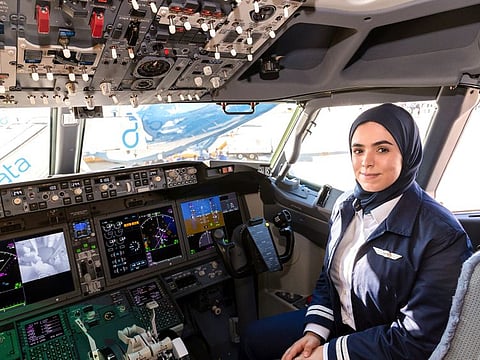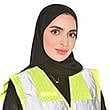From pilots to air traffic controllers, UAE women lead the way in aviation sector
In the UAE, women make up 42 per cent of the workforce in the sector

Dubai: For as long as she can remember, aviation has been a lifelong calling for 29-year-old Nouf Al Shehhi. Shortly after graduating from high school, Nouf, a First Officer with Dubai carrier flydubai, dabbled in IT and engineering only to realise it wasn’t something she could see herself doing for a long time.
“I started my theoretical flight training in Oxford, where I found myself often counting down the minutes until I could take to the skies. I’ll never forget my first day in the cockpit,” she said.
After graduating from Fujairah Aviation Academy in 2018 as a commercial pilot with 220 flying hours, she joined flydubai as a First Officer Cadet. “Since then, there’s been no turning back. I also earned a Bachelor’s Degree in Aviation Management,” said Nouf.
And despite the remarkable strides the UAE has made, entering a traditionally male-dominated industry remains daunting, according to her. Fortunately, increased recruitment efforts by airlines and industry players have enabled UAE women to shatter the longstanding challenges in the aviation sector, breaking through the metaphorical glass ceiling.
Take Jumana Aljasmi, an Air Traffic Management Systems Specialist at Dubai Air Navigation Services (DANS), for example. Jumana decided aviation was the place to be after reconnecting with a childhood friend (who worked as an air traffic controller) a few years ago.
National Development Programme has been a huge catalyst for UAE women to join the aviation workforce . There are plenty of opportunities for women in the sector now.

“I found myself constantly questioning the complexities of the work as an ATC. But, it’s been a year-and-a-half since I joined DANS, and I see myself doing this for the rest of my life,” said Jumana.
More needs to be done
In the UAE, around 27,000 women contribute to the aviation sector, making up 42 per cent of the workforce. But globally, women’s representation in aviation could be more robust. The Centre for Aviation (CAPA) indicates that women airline pilots globally are growing at merely 4 to 6 per cent.
And the International Society of Women Pilots (ISWAP) said regional carriers have ground to cover to improve their female pilot workforce figures.
Hiba Khalil, Government Affairs and Aviation Security manager of Wizz Air Abu Dhabi said, “Women in aviation often face gender stereotypes, work-life balance concerns, and limited access to leadership roles.” To address these challenges, industry stakeholders must adopt a multifaceted approach rooted in equality. “Additionally, flexible work arrangements and family-friendly policies can help women excel personally and professionally,” said Hiba.
Day-to-day challenges
Due to the intricate nature of her role, Jumana said that her primary hurdle during the early days of her career involved coping with the constant influx of new information. “Every day brings something new to learn. Initially, I felt overwhelmed by the sheer volume of information. Nonetheless, I relish the learning process. Working in ATC demands close teamwork, particularly during busy travel periods,” she said.
Jumana says her day is very ‘dynamic’, and she is involved in a wide range of activities. “For example, I start my day checking for abnormalities or faults in the flight plan list that appears on our radar system. "Peak travel times such as the Dubai Expo 2020, the upcoming COP28 or Dubai Airshow, are challenging because we have to ensure all travel during that time goes without a glitch, and this is what we do practice all year round to handle smoothly; especially the flight capacity in Dubai and the UAE in constant growth,” she explained.
To enhance the contribution of women to the growing aviation industry, industry stakeholders must continue to invest in education, training, and mentorship programmes that empower women to pursue careers in various roles.

Hiba at Wizz Air Abu Dhabi said her role in aviation security involves upholding the highest safety standards and liaising with relevant agencies to guarantee the safety of passengers and personnel. “Challenges are inevitable, but we must engage in open communication and transparent collaboration with our stakeholders,” she added.
Meanwhile, Nouf said, “We have a very good representation of female pilots at flydubai. I encourage young women to pursue their passions and seek opportunities in organisations that value their contributions.”
What’s the future for women?
At grass-roots levels, the participation of women in aviation is drastically improving, according to Jumana. “There has been an increased interest that we are noticing, especially among young women. But we need increased awareness, especially on social media, to increase participation,” she added.
Beyond the traditional roles, there are several promising opportunities for women to contribute to the aviation domain, said Hiba. “I see women taking on leadership roles, not only in traditional areas like cabin crew and engineering but also in fields such as aviation management, technology, and innovation,” she explained.
Nouf said aviation is at a stage where it has come back stronger than ever. “The aviation sector is a major contributor to the overall economy of the UAE and the future looks bright. Even the sky is not even the limit anymore,” she added.
Sign up for the Daily Briefing
Get the latest news and updates straight to your inbox






